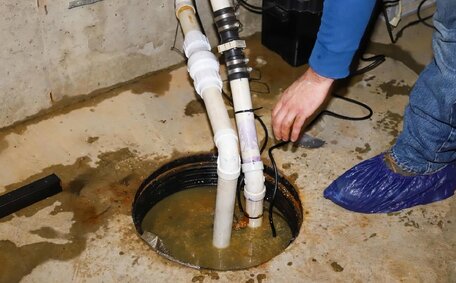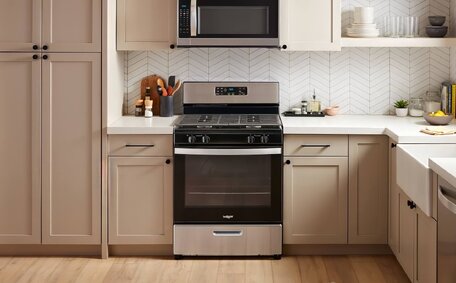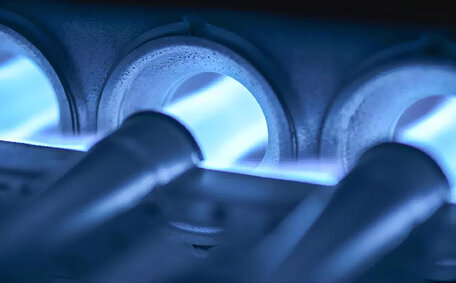How Fat and Grease Can Lead to Clogged Kitchen Drains
Cooking substances like fats, oils, and grease are major culprits in plumbing blockages, as they accumulate in pipes and impede water flow.
In your kitchen, the best way to handle oils like vegetable, olive, and corn oil, along with animal fats such as butter, lard and bacon drippings, is with proper disposal.
The rationale for a blocked drain, one of the most common problems, is oils and grease solidifying as temperatures drop. Layers of fats oil grease accumulate over time, eventually narrowing the crucial pipes within your home and causes blocked drains.
Although cooking oils are liquid when hot, they solidify upon cooling, sticking to pipe walls and ensnaring hair and food particles, which leads to blockages.
When fat and grease solidify within the drainage system, they obstruct kitchen sinks and can cause issues in the sewer lines.
This buildup can cause backups, slow drainage, foul smells, and even leaks. Preventing these problems starts by not pouring fats and oils down the drain.
To tackle existing blockages, start with a pot of boiling water down the drain to dissolve clogs, then flush with cold water. For stubborn blockages, a plunger or drain snake may be required, and a mix of baking soda and vinegar can aid in breaking down grease.
Repeat if needed.
Where Fat and Grease Comes From in the Kitchen
There are several common sources of fat and grease found in home kitchens that can contribute to drain clogs if poured down the sink:
- Cooking oils - Vegetable, olive, corn, canola, and other cooking oils used for frying, sauting, baking, etc.
- Butter and margarine
- Lard and bacon grease
- Meat fats from beef, pork, chicken, lamb, etc.
- Cream, milk, cheese, and other dairy products
- Food scraps and waste containing oils, fats, or grease
- Oily salad dressings, marinades, and sauces
During cooking, avoid pouring oil down the sink as it can stick to cookware and, if washed down, adhere to pipe walls. Greasy food scraps can also enter plumbing and lead to blockages.
Discard fats and grease responsibly by scraping them off plates and absorbing them from cookware with paper towels, disposing of them in the regular waste.
Cooking oils - Vegetable, olive, corn, canola, and other cooking oils used for frying, sauting, baking, etc.Butter and margarineLard and bacon greaseHow Fats and Oils Build Up Over Time
Fats, oils, and grease harden inside pipes as they cool, clinging to the interior and obstructing water flow.
With repeated pouring of oils and grease over time, layers upon layers of fatty residue build up on the pipe walls. Fats and oils contain long-chain fatty acids that do not dissolve easily in water. As they accumulate, the diameter of the pipe becomes narrower.
The narrowing pipes from grease buildup trap food debris more easily, slowing water flow and eventually leading to complete blockages from solid masses of congealed grease.
A layer of solidified oil can halve a pipe’s capacity. Drains where fats, oils, and grease are disposed of without maintenance will inevitably become obstructed.
To prevent blockages, don’t pour cooking oils down the sink; instead, collect and dispose of them properly, and wipe out greasy pans with paper towels to keep drains clear.
Fats, oils, and grease harden inside pipes as they cool, clinging to the interior and obstructing water flow.
With repeated pouils contain long-chain fatty acids that do not dissolve easily in water. As they accumulate, the diameter of the pipoff sewage odours when anaerobic bacteria release sulphurous gases, highlighting underlying hygiene problems.
Flies may find their way down into your sink through an unsecured drain. Larvae can establish themselves in the greasy buildup deep within your pipes, later emerging out your drains.
Regularly cleaning up oil and fat residues and not pouring them down your drain can prevent such blockage issues. Using hot water combined with baking soda and vinegar can also dissolve and dislodge existing grease deposits.
How to Prevent Clogged Drains
There are several effective ways to prevent clogged drains caused by grease buildup:
- Wipe pots, pans, and plates with paper towels before washing to remove excess fat and grease residue.
- Pour cooled grease from cooking into a covered container and throw it away with your regular trash. Never pour oils, fats or meat drippings down the drain.
- Use sink strainers to catch food scraps when washing dishes. Empty strainers into the garbage.
- Avoid using the garbage disposal to get rid of greasy food waste.
- Mix 1/2 cup baking soda with 1/2 cup vinegar and pour down drains weekly as a preventive measure to break up grease.
- Use enzyme drain cleaners or bacteria treatments monthly to safely dissolve grease and keep drains clear.
- Have drains professionally cleaned every 6-12 months to remove built up grease and maintain unobstructed pipes.
Making grease prevention part of your kitchen routine will help minimise plumbing issues and keep drains freely flowing. Contact a professional plumber if you suspect a grease clog has already occurred.
There are several effective ways to prevent clogged drains caused by grease buildup:
Wipe pots, pans, and plates with paper towels before washing to remove excess fat and grease residue.Pour cooled grease from cooking into a covered container and throw it away with your regular trash. Never pour oils, fats or meat drippings down the drain.Use sink strainers to catch food scraps when washing dishes. Empty strainers into the garbage.Proper Disposal of Fats and Oils
Pour cooled oils, grease, and pan drippings into a container, rather than letting them enter your kitchen plumbing. Screw the lid on tightly and then throw in the regular trash.Some local councils offer used cooking oil recycling programmes. Check if you can drop off oil at a municipal facility for conversion into biofuel.Absorb small amounts of oil or grease with paper towels or newspaper and dispose of in the garbage.Employ a fine mesh strainer to prevent fats from going down your drains during the cleaning of oily cookware and tableware. Scrape plates with a spatula before rinsing.Installing a grease trap under your kitchen sink prevents oils and fats from entering your pipes and causing blockages. Have the trap professionally maintained.Exercise caution and avoid hot water when washing oily dishes to prevent melting grease into plumbing systems. Use cold to lukewarm water instead.Clean sink drain strainers regularly to remove built up gunk and food scraps containing grease.Practicing proper disposal habits ensures we keep fats and oils from going down your sink. This prevents buildup in pipes that causes nasty clogs. Discarding oils correctly also benefits the environment.
Avoid Putting Grease Down the Drain
It’s crucial to prevent pouring any type of fat, oil, or grease down your kitchen sink, regional drains, or toilets. These substances can solidify, compile, and forge clogged drains and sewer obstructions, which can disrupt your entire plumbing network. It’s a significant habit to adopt: small amounts of fat or oil should not make their descent, a practice you should do diligently.
Here are some tips on how to properly dispose of fat and grease:
- Absorb cooled grease with paper towels or newspaper and throw it in the trash.
- Pour cooled cooking oil grease into a sealed container before disposing it in the rubbish bin.
- Use a mesh strainer in the sink when washing dishes to catch food scraps and empty it into the compost or garbage.
- Scrape plates and pans thoroughly with a spatula or paper towel before rinsing to remove grease residue.
Following these simple practises for grease disposal helps avoid plumbing disasters in your house, like blocked drains or sewerage overflow. Maintaining clear pipes is key to a smoothly functioning kitchen.
Dealing with Existing Clogs
If your kitchen drain is already clogged due to a grease buildup, there are several methods you can try to clear the blockage:
- Employ a plunger to work the drain energetically multiple times; this can loosen some blockages, similar to a vinegar baking soda reaction.
- Pour 1/2 cup baking soda down the drain, ensuring you don’t pour grease or other substances. The chemical reaction can help dissolve some of the grease.
- Boil a pot of water and carefully pour it down the drain. Boiling water down the drain can melt grease and break apart blockages.
- You can use a drain snake/auger to physically remove grease and debris stuck in the pipe.
- Try an enzymatic drain cleaner specifically designed to dissolve fat and grease deposits.
- If home remedies fail, hiring a professional plumber to remove stubborn pouring grease down the pipes is a wise choice.
Avoid using harsh chemical drain cleaners, as they can damage pipes and be hazardous. Addressing grease buildup promptly helps restore proper drainage and prevent worsening clogs.
Unclogging a Greasy Drain
A greasy drain can become clogged over time as drain blocked fat, oils and grease accumulate in the pipes. Here are some methods to try unclogging a drain blocked by grease buildup:
- Pour 1/2 cup of baking soda down the drain followed by 1/2 cup of vinegar. The chemical reaction can help break down grease deposits.
- Boil a pot of water and carefully pour it down the drain. The hot water can liquefy hardened grease and flush it through the pipes.
- Use a plunger to plunge the drain several times, forcing the clog loose with water pressure.
- Insert a drain snake/auger into the drain opening and manually break up and dislodge the grease clog.
- Acquire an enzymatic drain cleaner from a hardware store and use per product instructions to dissolve greasy obstructions.
Avoid using harsh chemical drain cleaners, as they can corrode pipes.
Contact a proficient plumber for help with severe grease-related clogs or if your blockages could stem from tree roots in the sewer line. They have specialised tools and expertise to fully restore proper drainage.
When to Call a Professional
When DIY approaches don’t unclog drains or improve slow drainage, it’s time to consult a professional plumber. For extensive blockages, professional water jet services may be required.
Foul sewage odours emanating from drains, sinks backing up with water, or clear signs of a grease blockage warrant action – what to do when faced with such plumbing woes? Call a professional.
Paddington Plumbing is very professional, and we highly recommend them for prompt, efficient resolutions to grease clogs and intricate drainage concerns. Our skilled technicians are on hand round the clock, doing an excellent job at restoring your plumbing and thwarting costly damage.
With over 15 years providing plumbing services in the Sydney area, our team has the knowledge and tools to diagnose problems and get your drains flowing freely again.
The Importance of Proper Grease Disposal
Proper disposal of fats, oils, and grease, by collecting them in containers and disposing with residential waste, is key to keeping drains clear and avoiding sewer overflows or bad smells.
Do not pour grease down drains; cool oils first and comply with local council instructions for grease disposal.






